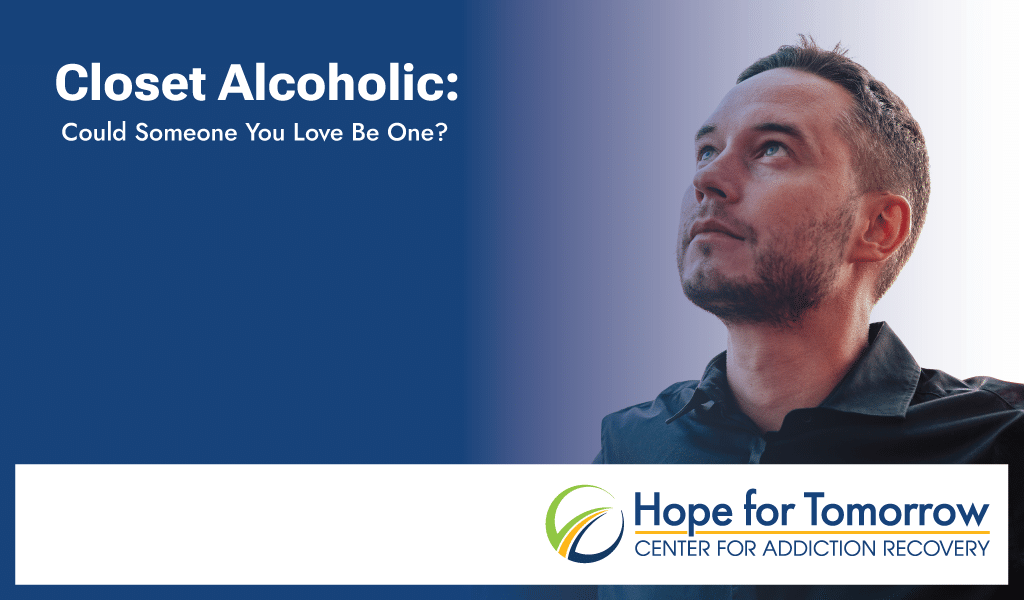

“The troubled drinker’s sleight of hand – dividing your confessions among close friends but never leaving any one person doused with too much truth.”
– Sarah Hepola
Does that quote sound familiar? Whether you’re the “troubled drinker” or close friend in the quote, there’s truth to it.
Often, when people have an alcohol use disorder, especially in the early stages, they keep it a secret until it’s impossible to conceal it. They hide, deny, and lie about their drinking habits, and they cover it up well. They’re what some people call “closet alcoholics.”
Not only does this dishonesty hurt loved ones in the situation – it also hurts the person with the alcohol use disorder.
In 2023, only a fourth of the people who needed treatment for substance use disorders received it. Some of that was due to a lack of resources, but a large part was the person not believing they needed help. After all, if they can hide their alcohol use disorder and function well in society, surely it can’t be that bad, right? Maybe it’s not an alcohol use disorder after all.
At Hope for Tomorrow, we know that isn’t the case. Alcohol use disorder can still destroy lives, no matter how well-hidden it is. If you suspect your loved one is a “closet alcoholic,” there are ways you can spot it, and there’s more information you should know. We’ll cover it all in this blog.
A “closet alcoholic” is someone whose alcoholism isn’t public. Their job performance isn’t suffering, and they’re keeping up with their education or other responsibilities adequately. They seem fine most of the time. Yet behind closed doors, they are drinking excessively. They often go to great lengths to hide their drinking habits from their loved ones. These people also might be referred to as “high-functioning alcoholics,” because alcohol hasn’t taken over their lives entirely. They can still function well in society and manage their relationships without too much trouble.
“Closet alcoholic” isn’t a technical or medical term. In fact, it’s one we don’t recommend using at all. “Closet alcoholic” may be easier to say than “person who is hiding their alcohol use disorder,” but it’s also more damaging. We don’t refer to anyone with other medical conditions like their conditions are all they are, but that’s exactly what calling someone an “alcoholic” does. Person-first language is important. It brings power back to individuals with substance use disorders. It reminds them, and everyone else, that they are human beings whose lives are just as valuable as any other, regardless of their addiction.
If you know someone hiding an alcohol use disorder, or you’re referring to someone who used to, you can say something like, “We didn’t know he had an alcohol use disorder,” instead of “He was a closet alcoholic.” There are a lot of better alternatives.

The signs of an alcohol use disorder are significantly harder to spot if someone is working hard to hide them. How can you tell someone is hiding an unhealthy drinking habit, then? There are a few things to look out for.
A major sign of an unhealthy relationship with alcohol is using it as a coping mechanism, and many people do. It’s common to drink after a hard day at work, after a rough breakup, or when you’re especially stressed – even for people without alcohol use disorders. If your loved one is hiding an alcohol use disorder, they’ll frequently turn to alcohol to unwind and feel better.
It’s also common to drink to celebrate. Your husband may go out for drinks with his friends after he scores a new promotion. Your daughter in college might party and drink excessively in honor of surviving final exams. None of this is unusual in our society, but if your loved one seems to be looking for excuses to drink, that’s a red flag, whether they’re drinking as a coping mechanism or a reward.
Because “closet alcoholics” don’t want to alert anyone that they might have an alcohol use disorder, they’ll likely be secretive and hide their alcohol. You might find alcohol in strange places in the house, or the car. You could find cans of alcohol concealed under other trash, too. Your loved one wants to avoid leaving evidence of their drinking behind as much as possible.
This might lead them to drink alcohol in secret, too. Vodka might become their drink of choice because it’s clear and doesn’t smell strongly like alcohol. That allows them to hide it in regular water bottles or mix it into non-alcoholic drinks without raising any suspicion. They also might brush their teeth, chew gum, or use mouthwash frequently to conceal any smell of alcohol on their breath.
Mysteriously disappearing during group events to drink is also a concern with people disguising alcohol use disorders. They’ll probably be more secretive about their whereabouts in general, and become defensive if you ask them where they were or what they were doing. They’ll also likely lie about how much they drink, and find ways to drink alone without anyone finding out. If you notice these behaviors in the person you love, especially when combined with other signs, their relationship with alcohol is worth examining.
Denial is a common aspect of alcohol use disorders, but it’s especially true with people who can function well despite their condition. The stereotypical image of someone with an alcohol use disorder is someone who has lost everything to alcohol and spends hours drinking their life away every day. While that’s certainly the case for some – and can end up that way for people who can hide their drinking habits eventually – many people don’t fit that description. That doesn’t make their alcohol use disorder any less real.
They often feel like their alcohol use disorder is less real, though. If they can still work and tend to their responsibilities, and their loved ones don’t notice there’s a “problem,” then there isn’t one in their view. If you mention their drinking to them, they’ll try to assure you that everything is fine, or even become defensive or avoidant.
If they’re hungover in the morning, they might try to play it off as just being sick. They’ll generally find a way to lie and make excuses for any way drinking interferes with their life. Not being “found out” is extremely important to them.
Heavy drinking involves 5 or more drinks in one day or 15 or more per week for men, and 4 in one day or 8 in a week for women. If the person you love drinks this much, especially week after week, you’re right to be concerned. It’s a sign of an alcohol use disorder.
If someone drinks a lot, they eventually develop a tolerance to alcohol. That means they have to drink even more to achieve the intoxicated feeling they want. If your loved one is hiding their drinking habits well, try to notice how long it takes them to “get drunk.” If it takes a while – especially longer than it used to – it could be a sign that they’re hiding an alcohol use disorder.
Drinking in unsafe and unusual situations is also a cause for alarm. That could include drinking while driving or operating heavy machinery, drinking at work, and more.

If the signs outlined in this blog remind you of your loved one, it might be time for them to seek alcoholism treatment.
Given they’re currently trying to hide the nature of their relationship with alcohol from you, chances are they won’t be ready yet. While it’s always ideal to get help as soon as possible, seeking treatment is ultimately up to your loved one and will have to happen on their timetable, when they’re ready.
That doesn’t mean you can’t help nudge them in the right direction. It might be difficult to get them to talk about their drinking habits at all, let alone get them into treatment, so be patient. Let them know you’re concerned about them, offer them ideas of treatment options, and don’t bail them out of situations when their alcohol use disorder gets them into trouble. Those moments can be key to them realizing they need help.
We know the position you’re in is painful. Know that compassionate care for your loved one is available whenever they’re ready for it.
Hope for Tomorrow, located in Point Pleasant, WV offers addiction recovery services to everyone who walks through our doors. No matter who you are, where you come from, or what you’ve done – you’re welcome at Hope for Tomorrow. Our compassionate staff is ready to assist you, and we have physicians on standby to ensure anyone with additional health conditions receives the comprehensive care they need, too. We focus on treatment that addresses every aspect of substance use disorders, from physical health complications to mental health. Give us a call at 877-679-8162 to learn more. We’d love to help.
Treatment today for a brighter tomorrow.